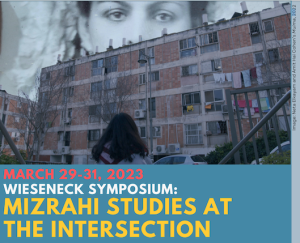Mizrahi Studies at the Intersection (day 3)


More information on the Frankel Institute's website.
This event is a part of the Frankel Institute for Advanced Judaic Studies theme year “Mizrahim and the Politics of Ethnicity,” led by co-head fellows Ruth Tsoffar, U-M Professor of Comparative Literature, Women’s and Gender Studies, and Judaic Studies, and Ella Shohat, professor of Cultural Studies at New York University. This theme year brings together thirteen scholars from three countries who will explore interdisciplinary and intersectional conversations on the meaning of ethnicity in the study of Mizrahi (Arab-Jewish) culture. The group consists of a dynamic forum of scholars from a variety of disciplines aiming to reflect and further expand, diversify, and theorize the discussion of Jewish/Israeli society and culture.
This symposium aims at addressing some of the key issues raised by Mizrahi studies as conceptualized through a transnational, transregional, multidirectional, and intersectional prism. Rather than producing a Mizrahi subject in isolation, the symposium seeks to problematize any fixed understanding of Mizrahiness by highlighting the ways this concept is dynamically shaped by class, race, ethnicity, gender, sexuality, religion, nation, and so forth. As such, the symposium strives to illuminate Mizrahi studies as a critical field not simply about the Mizrahim but also about decolonization of knowledge. It hopes to interrogate established categories by asking what constitutes legitimate knowledge when ways of knowing may themselves have to be reconceptualized in a discursive climate saturated with hierarchical, exclusionary, and even violent assumptions? Some additional questions posed by the symposium include: Which methodological paradigms and epistemic frameworks enable the shaping of fragmented memories into a broader and more relational narrative? What kind of obstacles do scholars face in the process of carrying out research involving archival documentation and oral transmission, when such data collection is entangled in histories of obscuring and silencing? What challenges does an academically normative discourse pose for those writing on subjects that touch on traumatic experiences and memories, at once personal, familial, and communal? And what lessons could be learned from more self-reflexive research practices and coping strategies in terms of future scholarship.
This symposium runs March 29-31, 2023.
